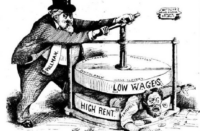Gabriel Rosenstock introduces and translates another poem from the Indian sub-continent, originally written in Konkani, the indigenous language of Goa.
We seem to accept “technological progress” and the McDonaldisation of the world as inevitable. Who wants to be called a Luddite? Yet on reading “When the Table Came” one is forced to ask what the price of “progress” really is, and to begin to count the losses.
If you knew nothing of the author you might say to yourself: “Here is a simple peasant who rails against the modern world and the collapse of the fabric of traditional society. “Hey, man, move on!” Would it change your mind to know that the author obtained a doctorate in French literature from Sorbonne Université?
“Came the Table” is not a sentimental re-creation of some utopian past. Manohar Sardessai’s poem is an anthem that can be read in tandem with the writings of green anarchists and anarcho-primitivists: everyone from Thoreau to John Zerzan, Derrick Jensen and other challenging thinkers of our own era. It is a cri de cœur that deserves to be widely known.
[one_half padding=”0 4px 0 4px”]
Nuair a tháinig an bord
Manohar Sardessai
Tháinig an bord,
I dteannta an bhoird, tháinig an ghloine, tháinig an cupán
Tháinig an scian, tháinig an spúnóg, tháinig an forc
Tháinig an pláta
Deireadh le suí is éirí
Tháinig an bord, i dteannta an bhoird an chathaoir
Tháinig an chathaoir, deireadh leis an stól, áilleacht an Rangoli,
Deireadh le suí an táilliúra, deireadh leis an seál
Deireadh leis an mbréid gabhail, leis an snáth, leis an éadach deasghnách,
Deireadh leis an bpláta duilleoige, uisce á spraeáil timpeall,
An scaraoid bhán, an cupán deasghnách, na cúig dúile
Deireadh leis an spúnóg dheasghnách, an clog, an “tikkli”
An marc dearg ar an gclár éadain, an mantra
an marc bán, an “pranayam,” an luaithreach bheannaithe
Deireadh leis an taos santail.
Tháinig an bord, tháinig an chathaoir
Tháinig na bróga, leis an gculaith éadaigh
Tháinig an bruscar ó gach áit
Tháinig an léine, tháinig an carbhat
Deireadh le ní na gcos is na lámh
Deireadh leis an aghaidh a ní, na fiacla
Tar isteach, suigh, tar isteach, suigh
Sábhálann sé am agus airgead
Tháinig an bord, deireadh leis an gcanji, mangó amh
Ruainne cnó cócó
Tháinig an bord, tháinig an tae, an caife
Tháinig an t-arán, an t-im, an t-anraith
Deireadh le cumhracht túise, solas ón lampa ola,
Cad a cailleadh, cad a baineadh amach?
Cad a baineadh amach, cad a cailleadh?
Tháinig an bord, an bord, an bord . . .
[/one_half]
[one_half_last padding=”0 4px 0 4px”]
When the table came
(Mez Ailem)
Came the table,
Along with it the glass, the cup
Came the knife, came the spoon, came the fork
Came the plate
No more sitting and rising
Came the table, with the table the chair
Came the chair, exit the stool, the beauty of the Rangoli
No more sitting cross-legged, no more shawl
No more loin cloth, no thread around, no ceremonial drape,
Gone is the leaf plate, the water sprinkling around,
The white cloth, the ritual cup, the five elements
Gone is the ritual spoon, the bell, the “tikkli”
The red mark on the forehead, the mantra
The white mark, the “pranayam,” the holy ash
Gone is the sandalwood paste.
Came the table, came the chair
Came the shoes, with the suit
Came the garbage from all around
Came the shirt, came the tie
No washing of feet, of hands
No washing the face, the teeth
Enter, sit, enter, eat
Saves time, profits
Came the table, exit the canji, the raw mango
The coconut bit
Came the table, came the tea, the coffee
Came the bread, the butter, the soup
Gone the fragrance of the incense stick, the light of the oil lamp
How much lost, how much gained?
How much gained, how much lost?
Came the table, the table, the table . . .
[/one_half_last]
The Famine Year
Jane Wilde, a native of Wexford, mother of Oscar, and poet, wrote under the pen name “Speranza” in John Mitchel’s United Irishman. The following extract (verses 1 and 6) is from her poem about the British-impelled genocide and the innocents they were exterminating.
The Famine Year
Jane Francesca Wilde
Weary men, what reap ye?—“Golden corn for the Stranger.”
What sow ye?—“Human corpses that await for the Avenger.”
Fainting forms, all hunger-stricken, what see you in the offing?
“Stately ships to bear our food away amid the stranger’s scoffing.”
There’s a proud array of soldiers; what do they round your door?
“They guard our masters’ granaries from the thin hands of the poor.”
Pale mothers, wherefore weeping?—“Would to God that we were dead,
Our children swoon before us, and we cannot give them bread!”
“We are wretches, famished, scorned, human tools to build your pride,
But God will yet take vengeance for the souls for whom Christ died.
Now is your hour of pleasure, bask ye in the world’s caress;
But our whitening bones against ye will arise as witnesses,
From the cabins and the ditches, in their charred, uncoffined masses,
For the Angel of the Trumpet will know them as he passes.
A ghastly, spectral army before God we’ll stand
And arraign ye as our murderers, O spoilers of our land!”
The poet knew that British arms controlled every Irish field. Bayonets, cannon, rifles, the lash, eviction and the gallows were used to seize Irish food (on the pretext that it was owned by some English owner-by-robbery). The identities and doings of the regiments involved are available in the Public Record Office in London to authors and academics subsidised by the Irish government, who neglect to use this knowledge. So the Big Lie continues to dominate in the general Irish perception of the Potato Famine. It is more than time for the real truth to be known.





